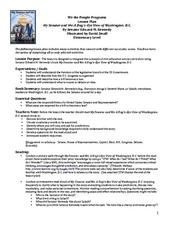iCivics
Branches of Power
Learners take on the roles of the legislative, judicial, and executive branches of government in the United States and work to develop public policy issues and ideas into laws in this engaging and well-designed online interactive.
Curated OER
The Branches of Government
After reviewing and reading about the three branches of US Government, complete this activity with your class. In groups, they will place their "cards" on the board under the correct branch. This lesson plan is weak and unclear. I'd make...
C-SPAN
Primary and Secondary Sources: Trailblazers in Congress
Trailblazers forge the path into uncharted territory, they establish a precedent for others to follow. Young historians research trailblazers in Congress using primary and secondary sources to profile outliers that changed the face of...
University of North Carolina
Congress and the Legislative Process: A Simulation in How a Bill Becomes a Law
As part of the study of the legislative process, scholars research redistricting and gerrymandering and the effects of these activities on lawmaking. On day one of the two-day plans, individuals redistrict the state of Elbonia so that...
Curated OER
My Senator and Me: A Dog's-Eye View of Washington, D.C.
Although this legislative process lesson is designed to accompany a specific text, it is valuable independently. Young learners participate in a picture walk (worksheet included) through My Senator and Me: A Dog's-Eye View...
C-SPAN
Presidential Veto and Congressional Override
One of the key powers of the executive branch is the president's ability to pass or veto legislation proposed by Congress. Congress, the legislative branch, on the other hand, can override a president's veto. Five film clips show how the...
National Endowment for the Humanities
Lesson 4 James Madison: Internal Improvements Balancing Act—Federal/State and Executive/Legislative
Who has the power? The founding fathers asked the same question when the United States was formed. Learners explore issues that arose during Madison’s presidency that raised constitutional questions. Through discovery, discussion, and...
iCivics
Mini-Lesson: The Incumbent Advantage
Does the person running for re-election have an advantage over the challenger? Scholars explore the concept of incumbent advantage during elections using an informative mini-lesson explaining the legislative branch. In pairs, they...
iCivics
Mini-Lesson: Gerrymandering
Who determines the structure of voting districts? The concept of gerrymandering brings to light the ongoing issue of how those running for office gain votes. Hands-on activities enable scholars to analyze the re-drawing of voting...
iCivics
Foreign Policy: War
What is the difference between foreign and domestic policy? What are the primary differences in what the United States hopes to accomplish through foreign aid, the military, and the creation of treaties? Your class members will examine...
iCivics
Mini-Lesson: Congressional Committees
How exactly do both houses of Congress come to a formal decision on an issue? Scholars research the use of congressional committees as part of the legislative process. By using current events to analyze information, they see the role...
iCivics
Mini-Lesson: Filibusters
How long can you speak without stopping? Scholars analyze the concept of a filibuster in the United States Senate using an installment of the Legislative Branch series of mini-lessons. They research recent filibuster attempts in the...
C-SPAN
Choice Board: Expressed and Implied Powers
Article 1, Section 8 of the United States Constitution expressly lists powers given to Congress. Over the years, lawmakers have expanded the enumerated powers to include powers implied by the list. To better understand the significance...
Franklin D. Roosevelt Presidential Library & Museum
Practice Passing Laws
Getting a bill through the legislative process to become a law in the United States is a very long and difficult procedure by design! To understand the deliberation, debate, and compromises involved, class members take on the role...
C-SPAN
Supreme Court Justices Research and Resumes
According to Article III, Section1 of the United States constitution, the only qualification one needs to be appointed to the Supreme Court is to demonstrate "good behavior." The president and Congress are given the power to determine...
iCivics
Voting in Congress
In a role-play activity acting as members of either the Senate or House of Representatives, class members will vote on bills to halt mail delivery on Saturdays in the United States and to raise the minimum wage. Through an included...
Heritage Foundation
Courts and Judges
If the Supreme Court is so supreme, why do all cases not just start there? High schoolers learn why every case does not start at the Supreme Court as well as the importance of hierarchy in the US judicial system in the 11th installment...
Heritage Foundation
The House of Representatives
The House of Representatives has a lot of responsibility in the United States government. But how did it all begin, and why is it the way it is now? A comprehensive lesson plan answers all of these questions about the US...

















